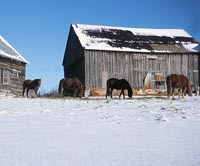Horses Can Thrive in Winter with Three Important Things
Horses Can Thrive in Winter with Three Important Things


Despite the recent brief warm up, Kentucky is deep in the heart of winter with more cold and wet weather looming in the next few months. To keep the state’s biggest revenue generators in tip-top shape, horse owners should pay special attention to three very basic needs – shelter, feed and water.
University of Kentucky Extension Horse Specialist Bob Coleman said that many horses can be easily managed outside in the colder months if given a few “creature comforts.”
“Shelter doesn’t need to be elaborate, but it does need to provide protection from the wind and some protection from the different forms of precipitation we get in Kentucky,” he said. “Horses grow winter hair coats to protect them from the cooler temperatures; however, those hair coats will not be as effective when the wind blows and even less effective if the horse gets wet in rain or wet snow conditions.”
If horses do get wet, Coleman suggests bringing them inside a barn to dry and warm up; otherwise, basic shelters in the field provide adequate relief from the weather.
Adequate and high-quality feed is also important during the winter. Most horses are fed hay as the mainstay of their winter diet. As the weather turns colder, a horse’s energy needs increase and owners can meet those needs by feeding more high-quality hay.
“As the horse eats and digests hay, it creates internal heat of digestion which can help maintain body temperature,” Coleman said. “If you lack hay or you aren’t sure of the quality, adding a concentrate to the daily ration can be helpful. Just remember to introduce it slowly if your horses have not been eating it regularly.”
Water is critical to any animal’s survival year-round, but when it’s colder horses tend to drink less water. Coleman said owners need to make sure their horses are getting adequate water in the colder months.
“Water is the most crucial item for winter horse care,” he said. “If horses take in less water, it can lead to a lower food intake as well, and that makes it hard for a horse to meet its daily nutrition requirements. They also need adequate water for normal digestion to occur.”
Coleman said it is not uncommon to see an increase in impaction colic in horses that eat a high forage diet, without adequate water intake. He said horse owners should check to see the water is not too cold and check for problems with tank heaters, since both of these factors can decrease water intake.
“While it’s not nice to be out looking after your horses when it’s cold and wet, it is important that they get enough feed and water and a place for protection from the elements,” Coleman said.
